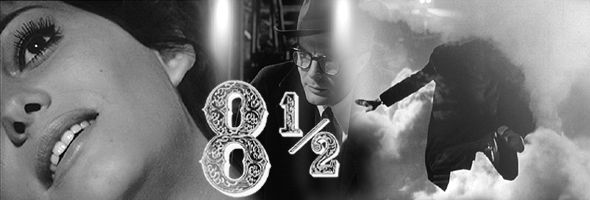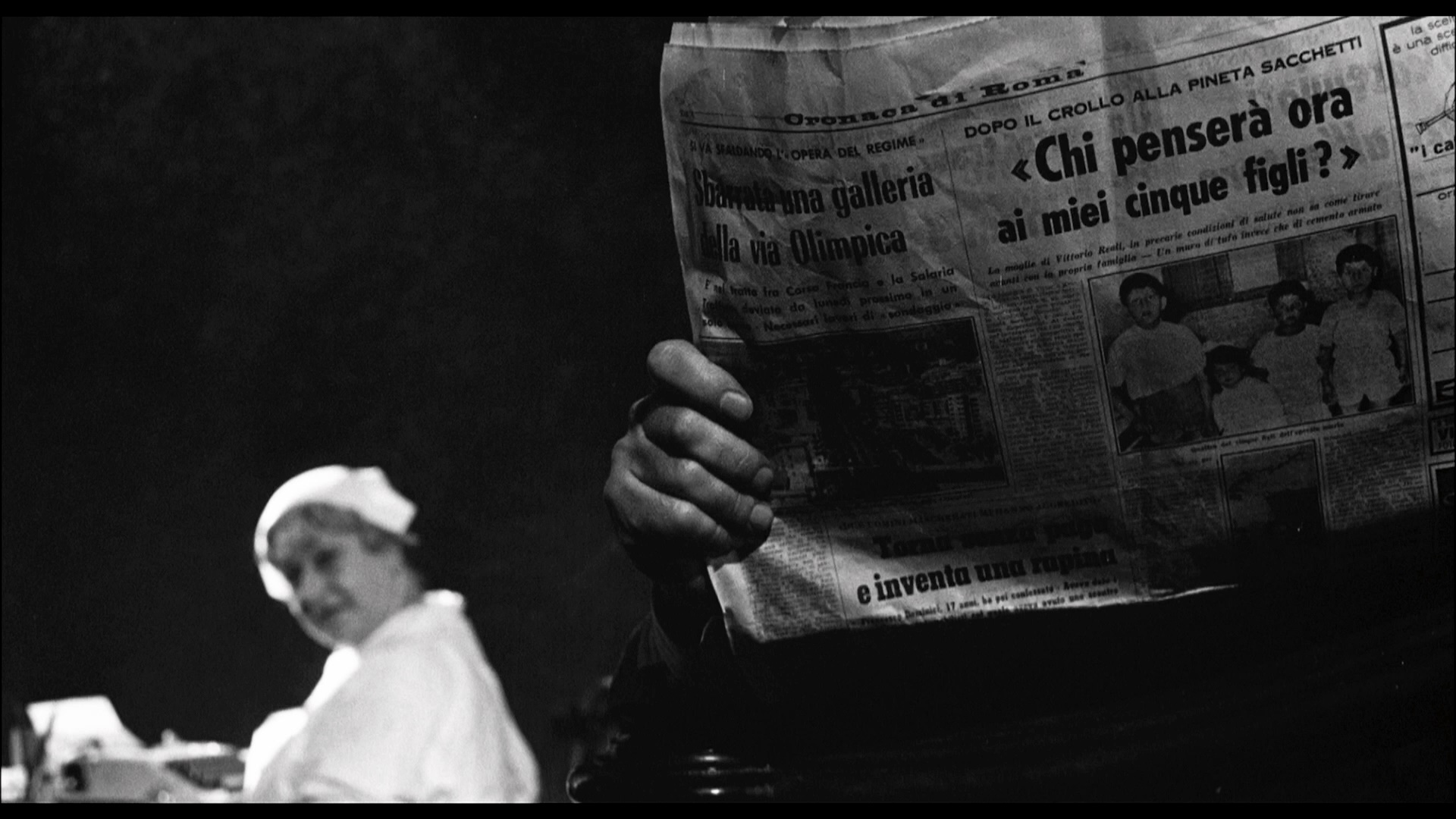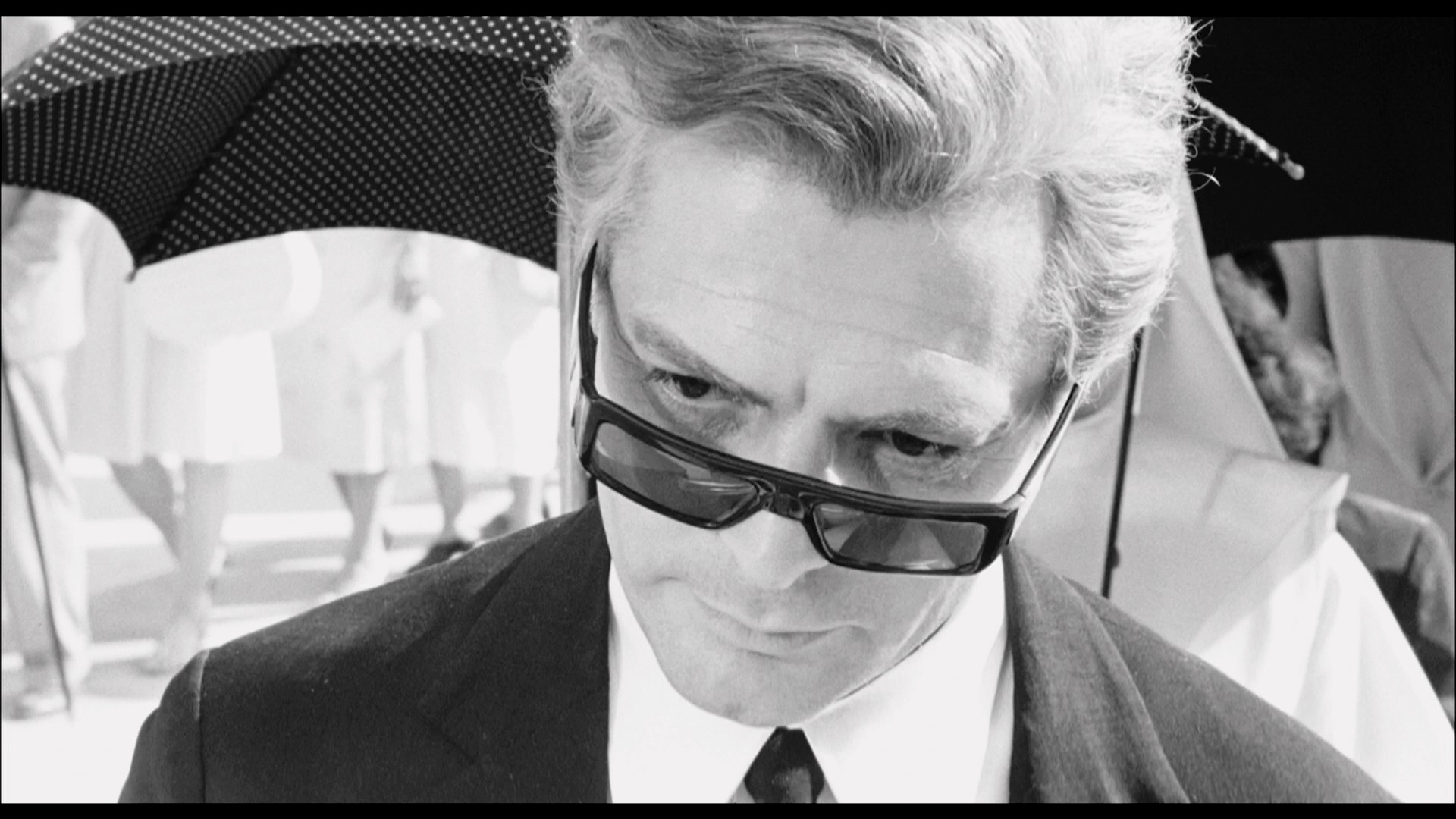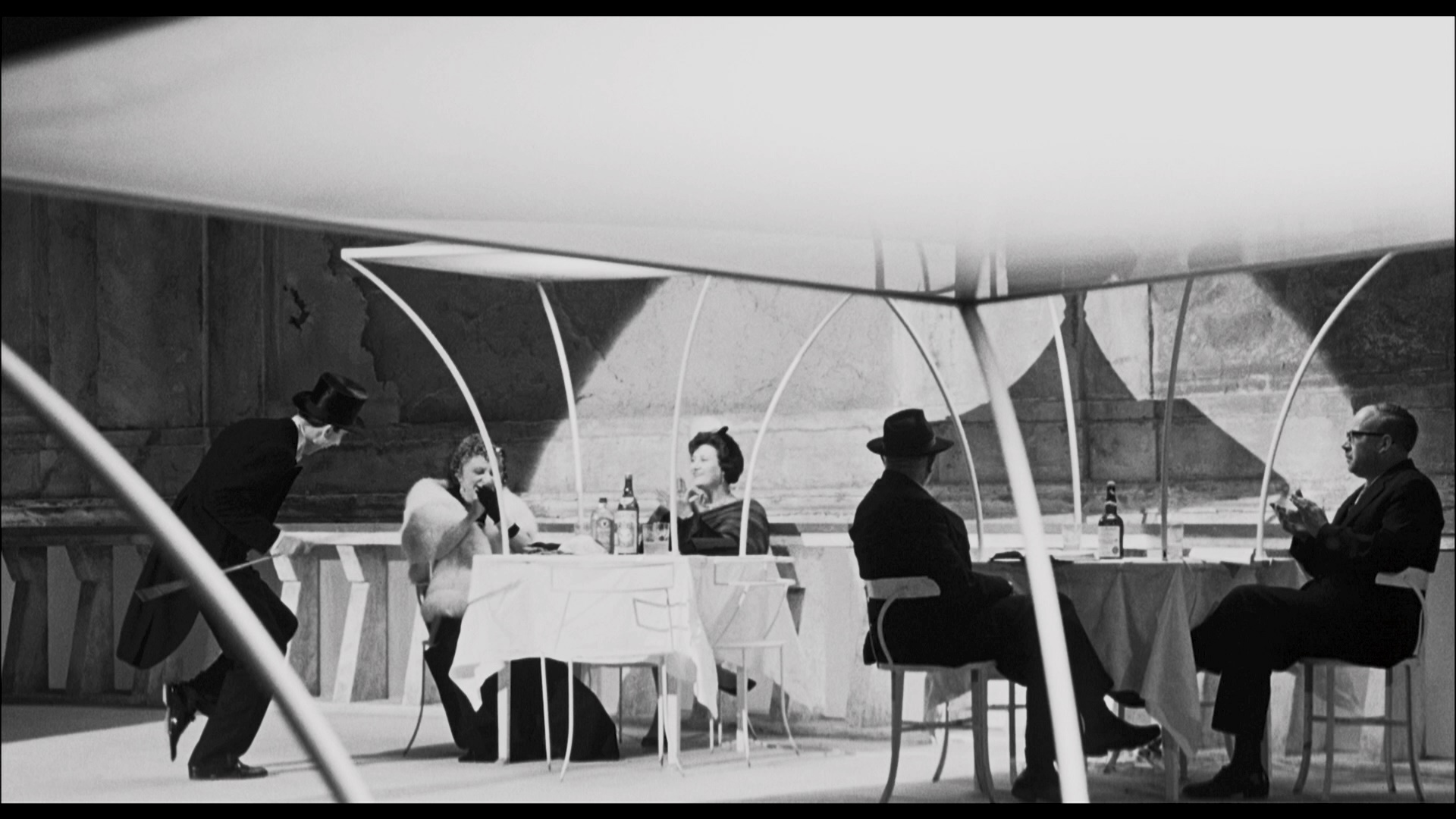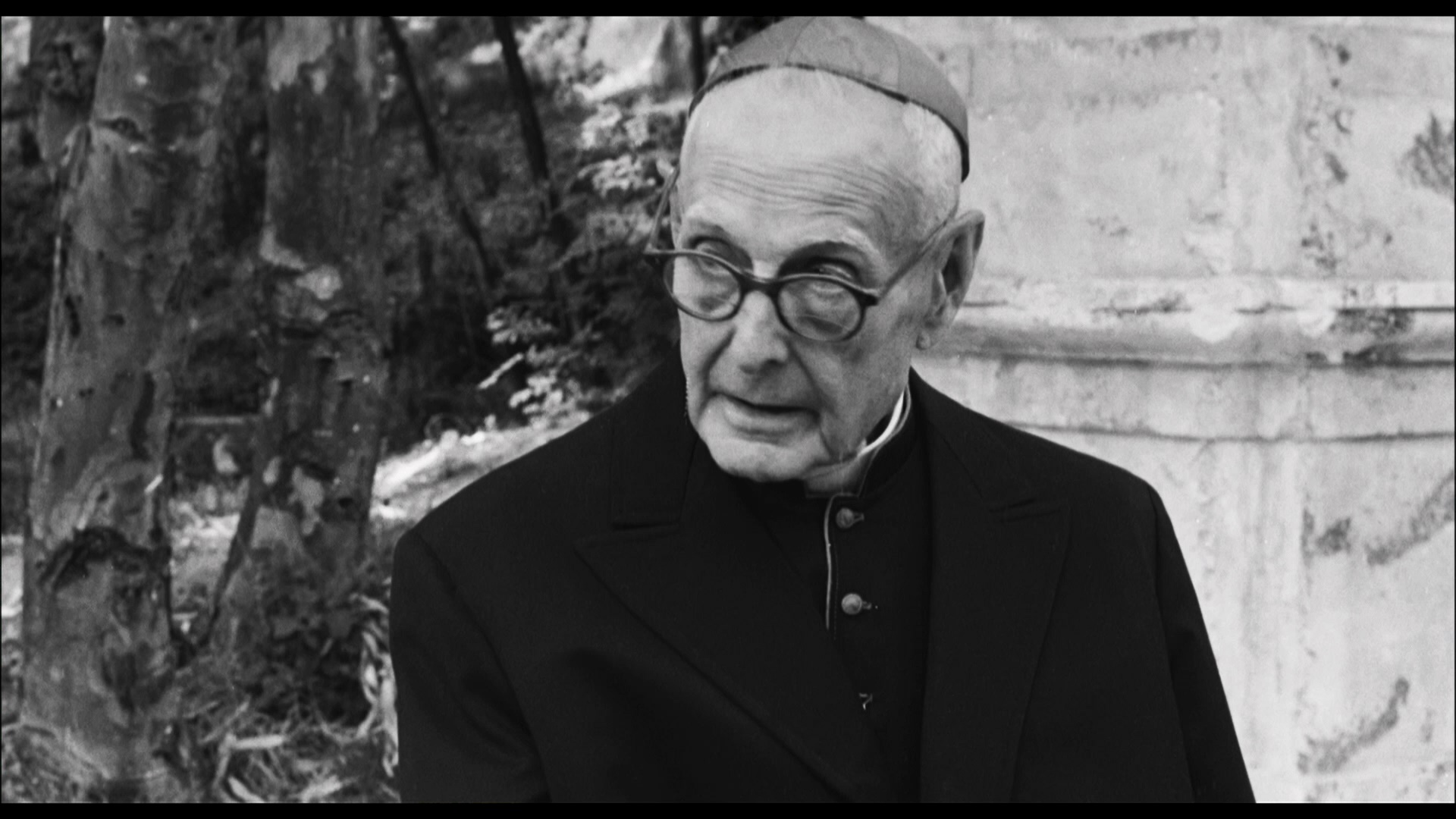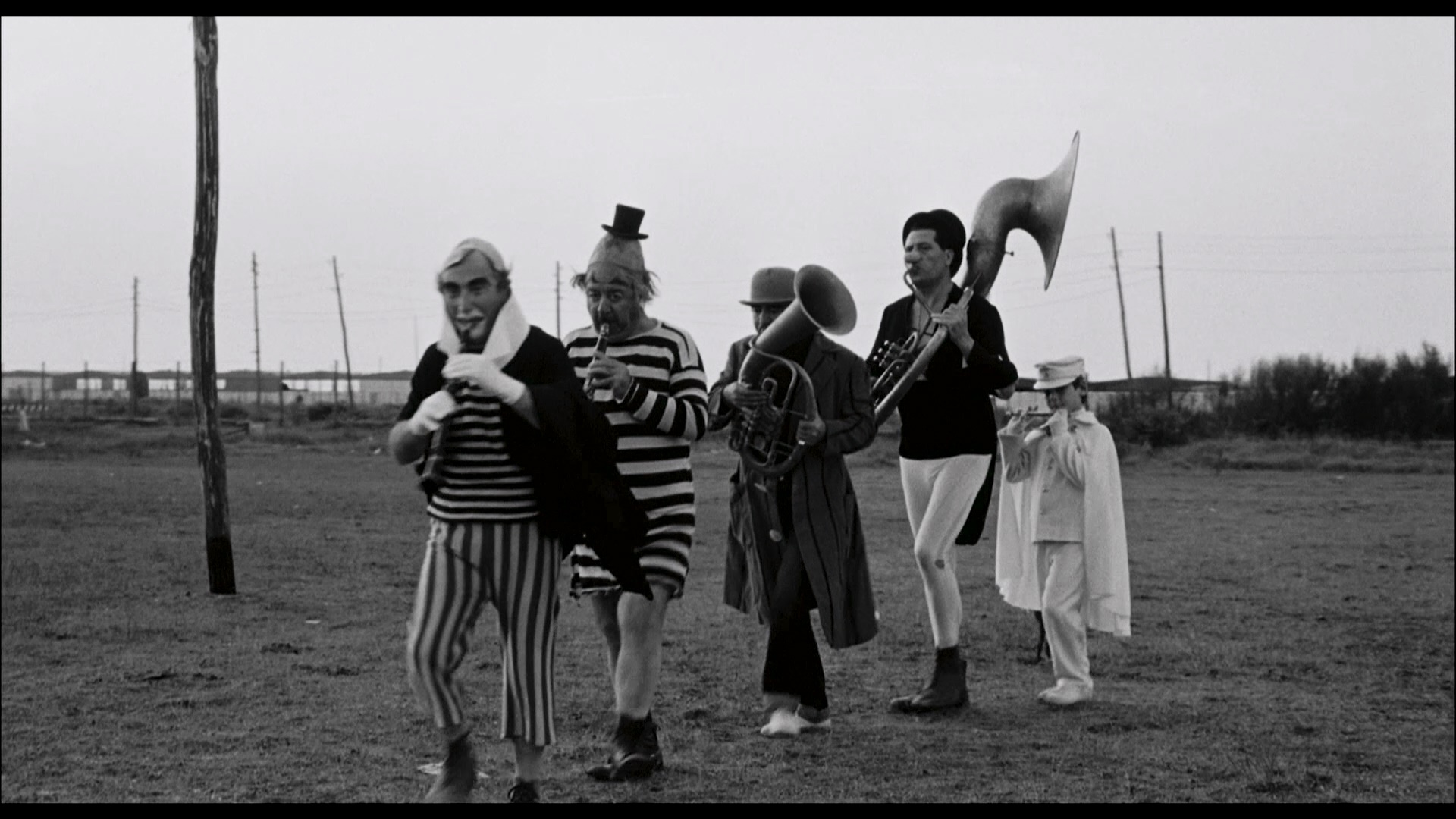B&W, 1963, 138 mins. 10 secs.
Directed by Federico Fellini
Starring Marcello Mastroianni, Claudia Cardinale, Anouk Aimée, Sandra Milo, Rossella Falk, Barbara Steele
Cult Films / Argent Films (Blu-ray) (UK RB HD), Criterion (Blu-ray & DVD) (US RA/R1 HD/NTSC) / WS (1.85:1) (16:9)
If you think of the Federico Fellini  filmography as a series of college courses, 8 1/2 is Calculus III - the difficult, towering, but rewarding hurdle after which everything else feels
filmography as a series of college courses, 8 1/2 is Calculus III - the difficult, towering, but rewarding hurdle after which everything else feels 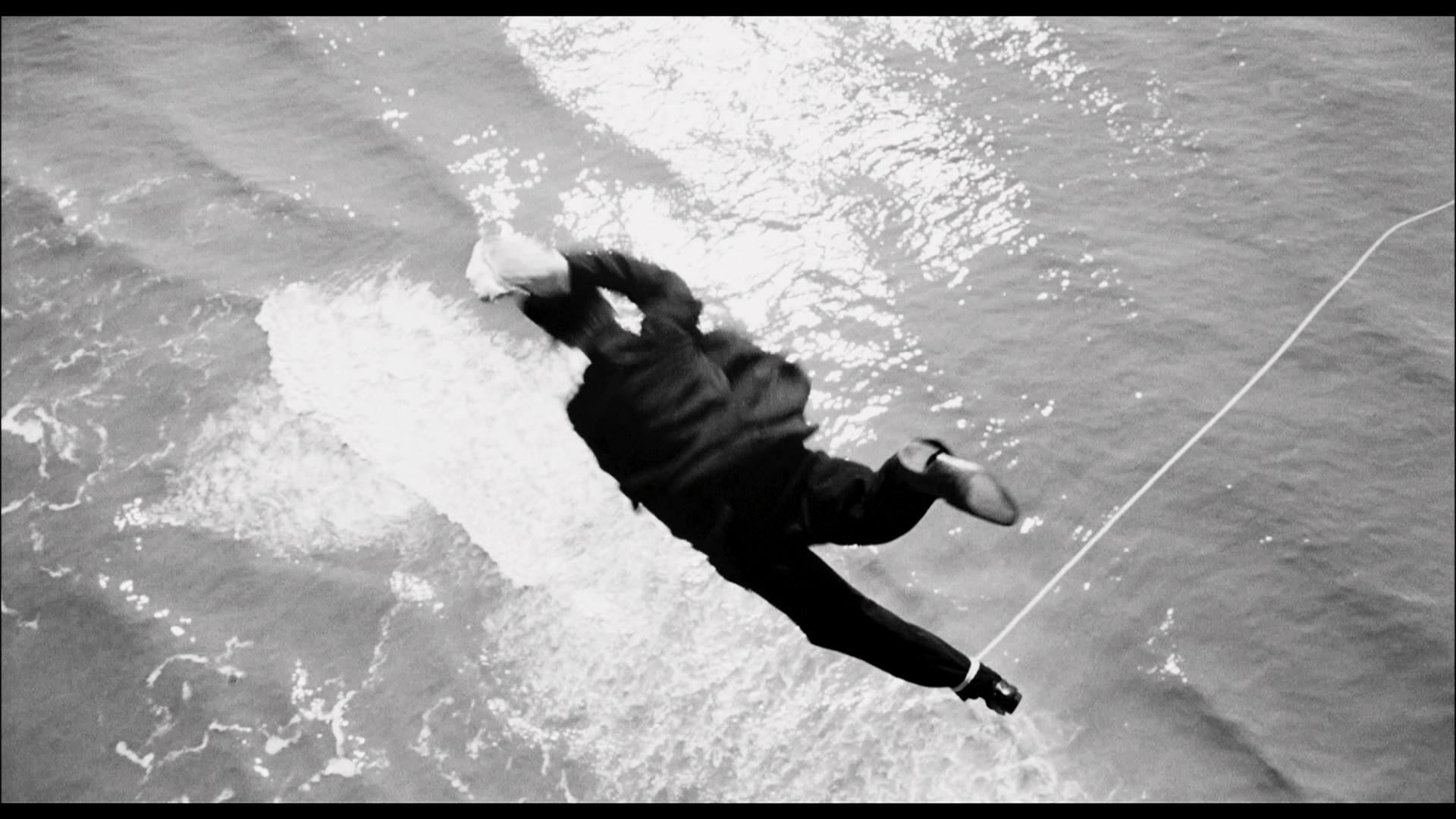 utterly simple. Is it a work of towering brilliance or a self-indulgent, rambling spectacle? Well, both of course, and that's most of the fun.
utterly simple. Is it a work of towering brilliance or a self-indulgent, rambling spectacle? Well, both of course, and that's most of the fun.
Burned out by the hectic pace of maintaining his status as a celebrity director, Guido (Mastroianni) finds temporary release by drifting off into fantasies, the first of which finds him ascending into the clouds during a traffic jam. Guido seeks solace and rejuvenation at a remote health spa for the rich and privileged, where he continues to encounter journalists, his producer (Guido Alberti), and most inconvenient of all, his aloof wife, Luisa (Aimée), and his sultry mistress, Carla (Milo). His flights of fancy continue as he flashes back and forth between past, present, and future, his childhood memories sprinkled with outrageous exaggeration and moments of pure surrealism: a towering buxom beauty, a horde of women (including Italian horror icon Steele) submitting to his will as he whips them into shape, and the angelic epitome of inspiration, Claudia Cardinale herself. Meanwhile his producer initiates preparations for a massive science fiction film, the antithesis of the pure and honest film Guido longs to make.
Along with La Dolce Vita, this film personifies what people associate with the term "Felliniesque." Buxom women bouncing across the screen, eccentric people gallivanting through fields and carnivalesque settings, and bizarre fantasy sequences pepper this sprawling foray into the mind of a director unsure of how to progress with his next film. Of course, it's 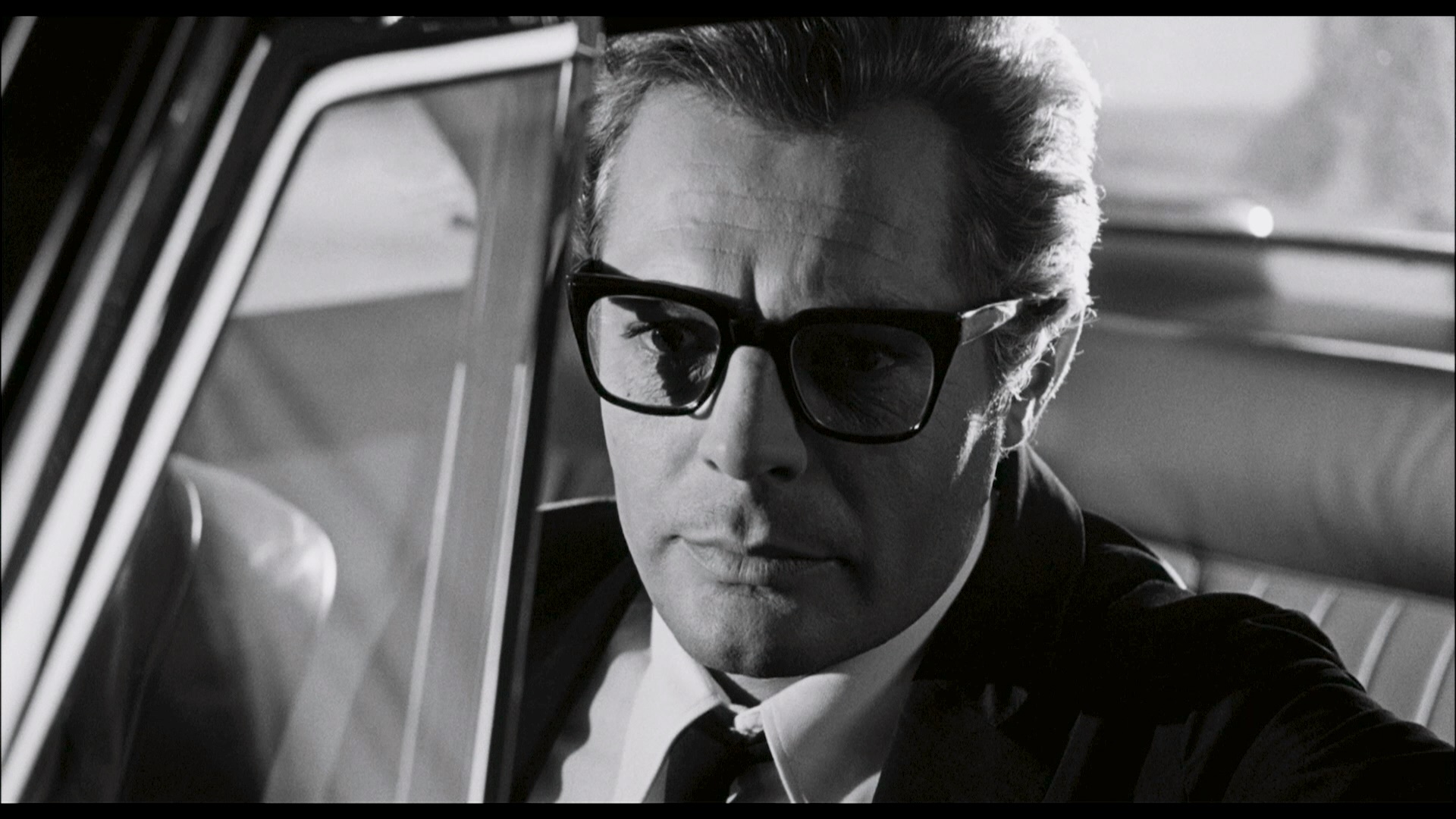 no
no 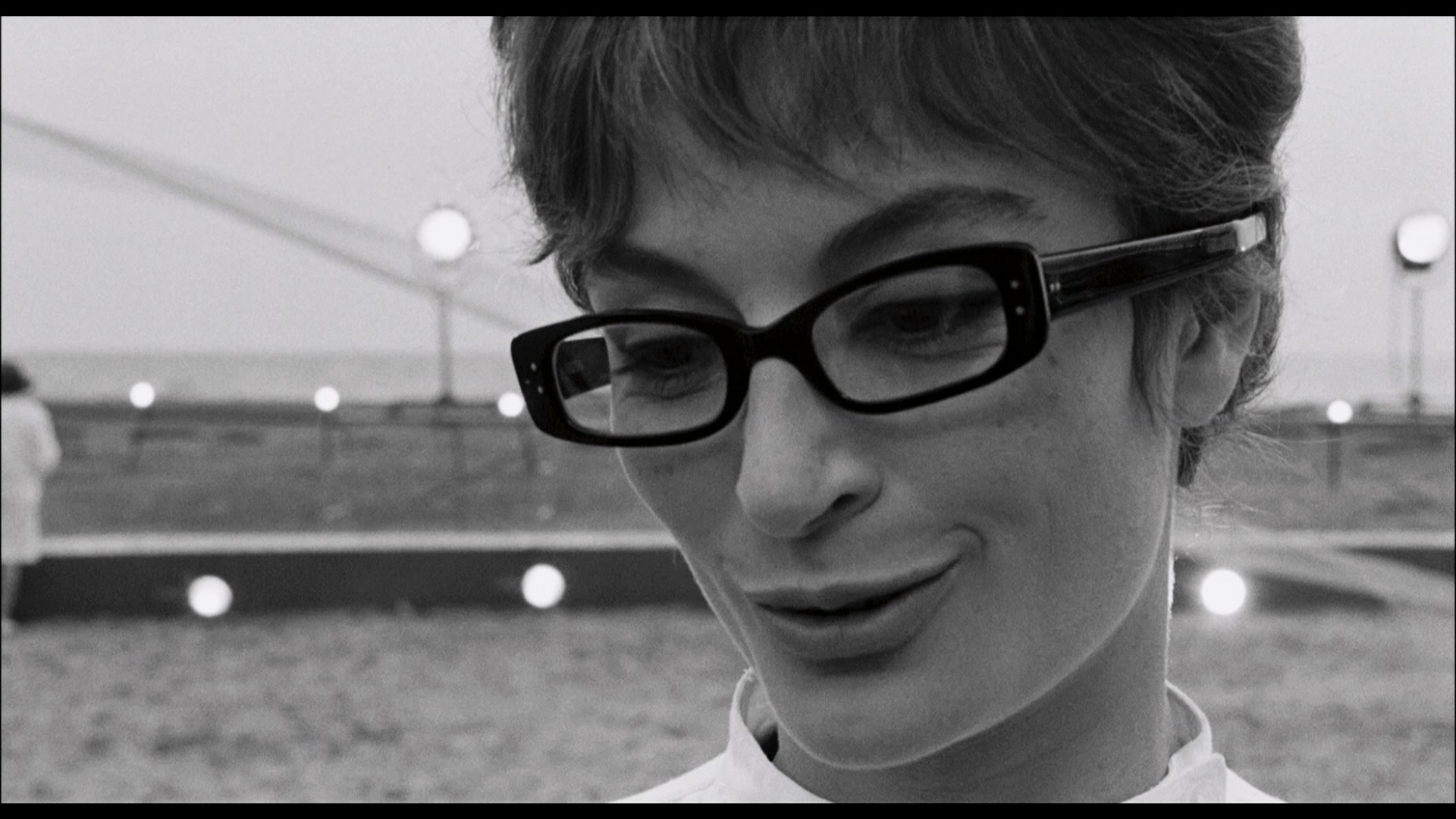 secret that this subject was exactly the problem Fellini himself had at the time, making this an elaborate game of mirrors in which Fellini and his cinematic alter ego become difficult to separate. Everyone involved operates at the top of their form here, from all of the women (who seem to appreciate being at the center of Fellini's attention when his camera turns to them) to Nino Rota's buoyant score, easily one of his best.
secret that this subject was exactly the problem Fellini himself had at the time, making this an elaborate game of mirrors in which Fellini and his cinematic alter ego become difficult to separate. Everyone involved operates at the top of their form here, from all of the women (who seem to appreciate being at the center of Fellini's attention when his camera turns to them) to Nino Rota's buoyant score, easily one of his best.
Criterion's early laserdisc of 8 1/2 looked fairly good for the time, considering, and certainly beat out the more widely seen English dubbed edition from MPI, which was washed out and barely letterboxed at 1.55:1. The dubbing per se actually wasn't bad at all actually since Fellini as usual had all of the Italian dialogue looped in later with only scant regard for the actors' lip movements anyway. In either English or Italian, you're not hearing the actors' voices, and in some cases the English matches up. (His later films, most notably Satyricon, And the Ship Sails On, and Casanova, actually hold up as well or better in their English dubbed versions, which are sadly the lesser seen variants.) In 2004, the film made its DVD bow from Criterion looking solid enough with the Italian-language version featuring optional English subtitles. More than just a presentation of the movie, the DVD is also a handy crash course in Fellini in general. A commentary track (apparently edited together from two different locales) features Fellini critic and colleague Gideon Bachmann and NYU film professor Antonio Monda dissecting the film and placing it in context within the director's career. The track starts 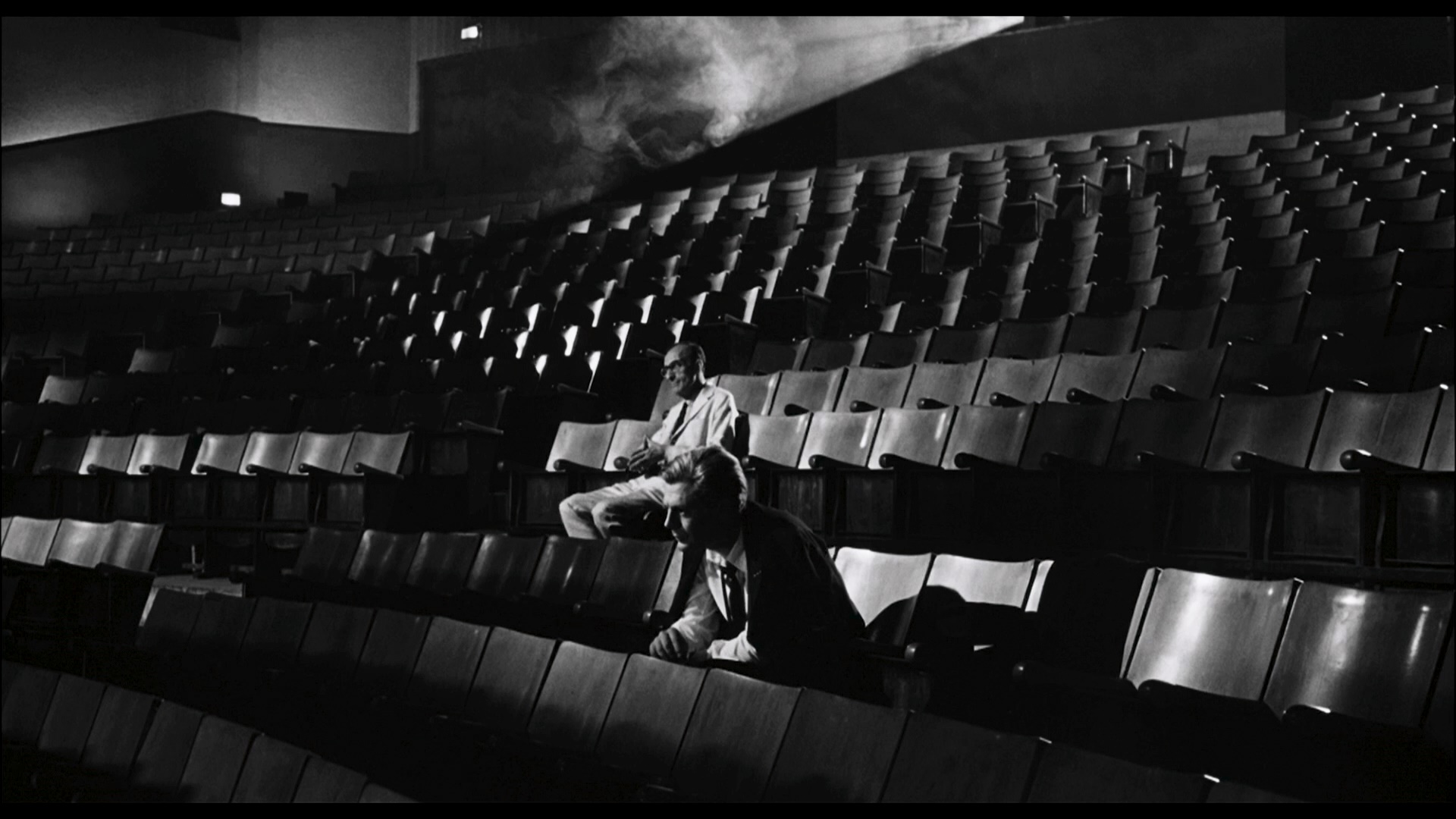 uneasily, as most of the discussion points out to the viewer clues to differentiate between the dream sequences and reality (which also drains out a lot of the fun from the film), but gradually the commentary becomes looser and less focused on picking apart what everything in the film might
uneasily, as most of the discussion points out to the viewer clues to differentiate between the dream sequences and reality (which also drains out a lot of the fun from the film), but gradually the commentary becomes looser and less focused on picking apart what everything in the film might 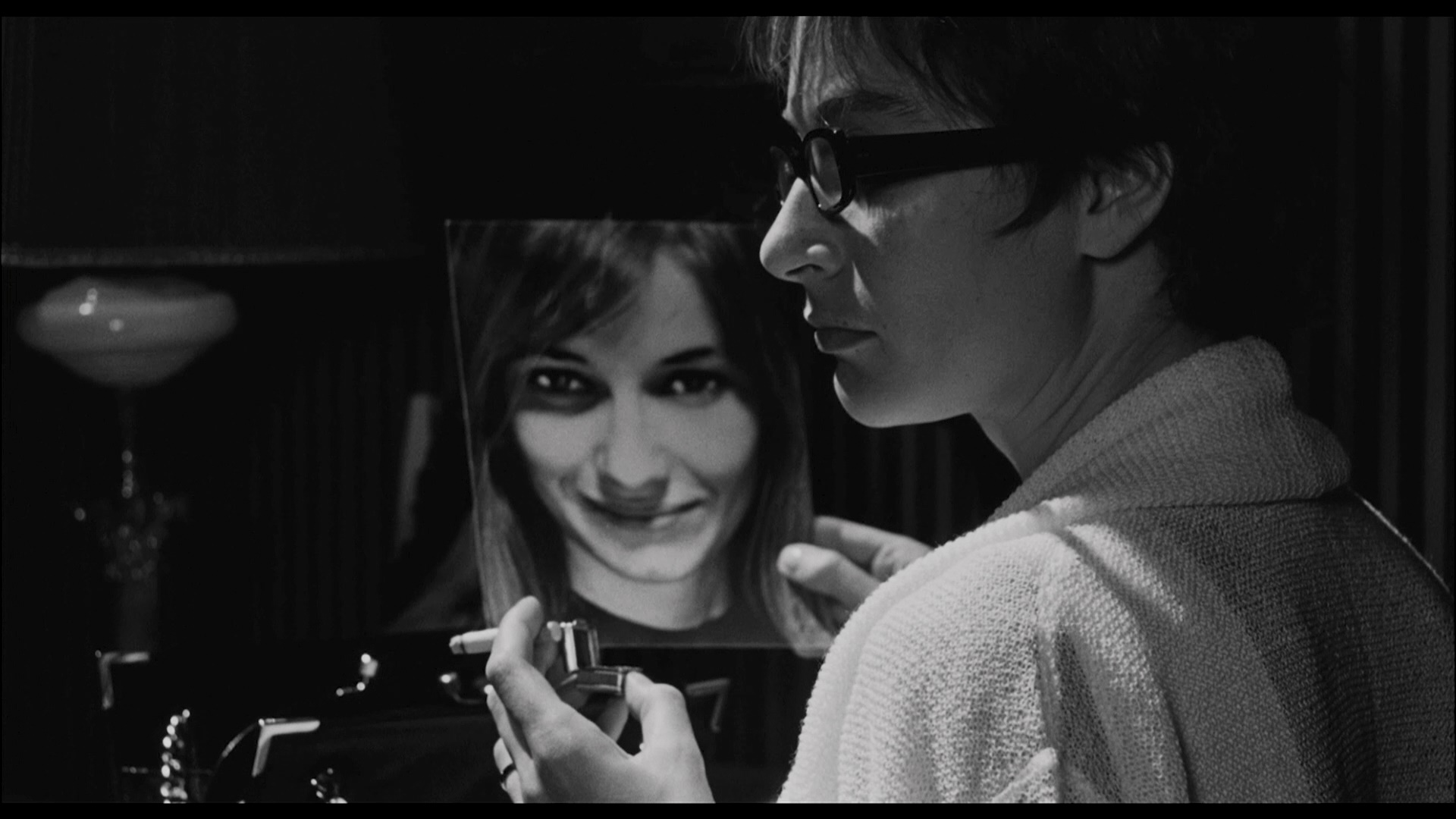 mean. Other extras include an engaging seven intro by Terry Gilliam (7m30s) which oddly doesn't play before the film itself and must be selected separately, an illustrated booklet of Fellini essays (including snippets from his autobiography), and the kinky American theatrical trailer (prominently pushing distributor Joseph Levine, as usual). A second disc features "Fellini: A Director's Notebook" (51m16s), an autobiographical study detailing his work habits, and "Nino Rota: Between Cinema and Concert" (47m28s), a tribute to one of Italy's most esteemed musical talents. You also get a large selection of production and promotional photographs and new video interviews with Milo (26m37s), director Lina Wertmüller (17m28s), and Vittorio Storaro (17m24s), a disciple of this film's brilliant cinematographer, Gianni di Venanzo. In 2010, Criterion upgraded the film to Blu-ray with an HD port of what appears to be the same transfer, which looked a little dated by that point but got the job done well enough (even if it falls way short of later stunning presentations like La Dolce Vita). All of the extras are ported over here from the DVD along with the addition of "The Last Sequence" (50m24s), a new documentary on Fellini’s lost alternate ending for 8½. Also included are a standard gallery, a selection of Bachmann's rare photos, and a booklet with
mean. Other extras include an engaging seven intro by Terry Gilliam (7m30s) which oddly doesn't play before the film itself and must be selected separately, an illustrated booklet of Fellini essays (including snippets from his autobiography), and the kinky American theatrical trailer (prominently pushing distributor Joseph Levine, as usual). A second disc features "Fellini: A Director's Notebook" (51m16s), an autobiographical study detailing his work habits, and "Nino Rota: Between Cinema and Concert" (47m28s), a tribute to one of Italy's most esteemed musical talents. You also get a large selection of production and promotional photographs and new video interviews with Milo (26m37s), director Lina Wertmüller (17m28s), and Vittorio Storaro (17m24s), a disciple of this film's brilliant cinematographer, Gianni di Venanzo. In 2010, Criterion upgraded the film to Blu-ray with an HD port of what appears to be the same transfer, which looked a little dated by that point but got the job done well enough (even if it falls way short of later stunning presentations like La Dolce Vita). All of the extras are ported over here from the DVD along with the addition of "The Last Sequence" (50m24s), a new documentary on Fellini’s lost alternate ending for 8½. Also included are a standard gallery, a selection of Bachmann's rare photos, and a booklet with 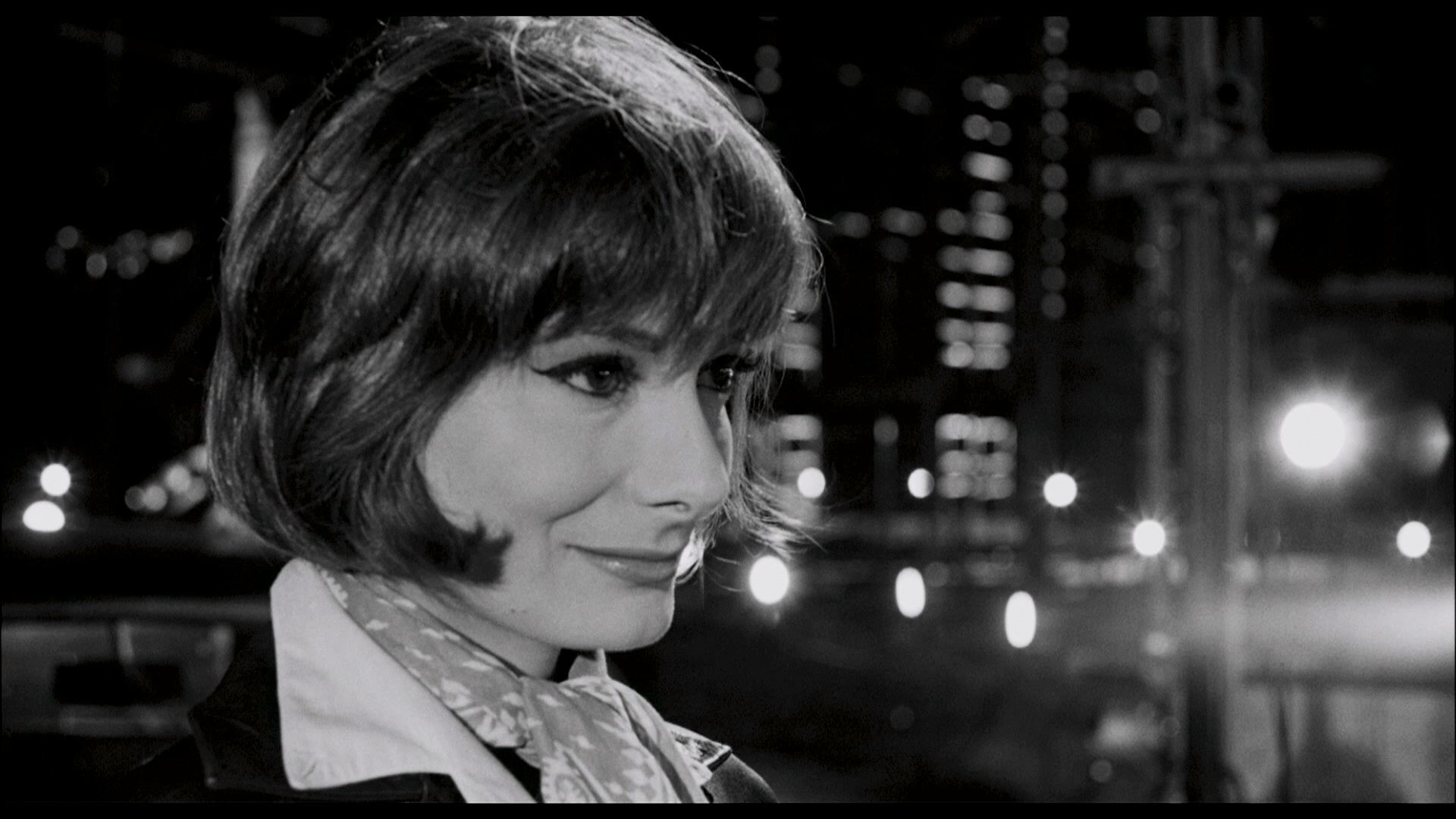 Fellini essay extracts and notes by critics Tullio Kezich and Alexander Sesonske.
Fellini essay extracts and notes by critics Tullio Kezich and Alexander Sesonske.
Meanwhile in the U.K., Argent Films (a companion label to Shameless Screen Entertainment) issued a Blu-ray in 2013 featuring a "Fellini 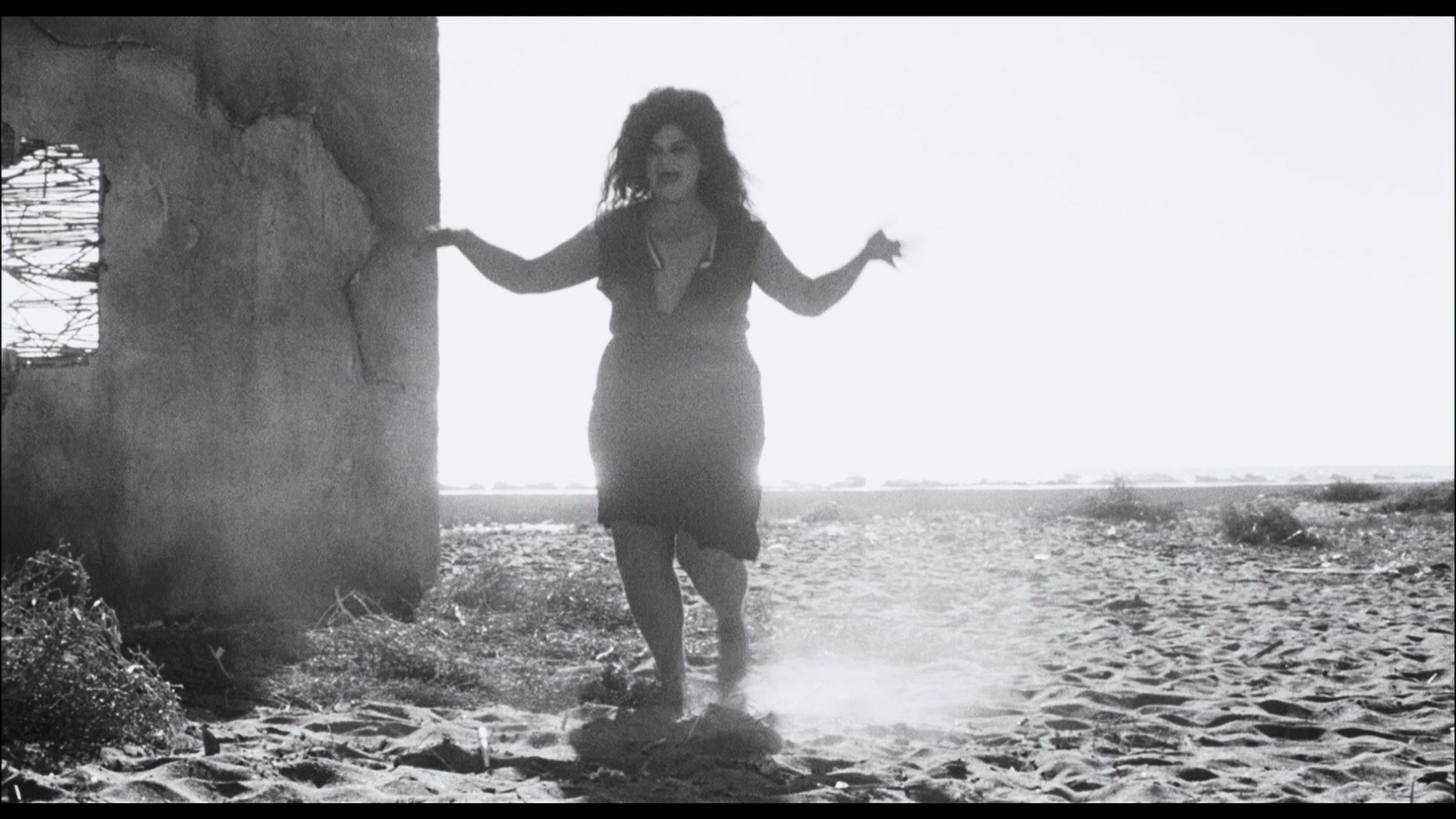 Tribute" (1m16s), a quick text homage including the copy from his Honorary Oscar acceptance speech, and "The Lost Ending," the same featurette as the Criterion's "The Last Sequence." The feature itself is culled from what appears to be the same transfer as the Criterion. In 2020, Cult Films (essentially the much more productive arthouse rebirth of Argent) reissued the film on Blu-ray, porting over both "The Lost Ending" and "Fellini Tribute." However, you also get a new interview with Milo, "A Charming Spirit" (38m39s), which is a more in-depth recollection of Fellini from their first meeting at Fregene to the audition process and on to the circus-like atmosphere of the production, as well as her own take on Fellini's portrayals of women. Then "An Extremely Beautiful View" (16m9s) is a new, different Wertmüller interview about her memories of Fellini and Mastroianni, working as an assistant director to the consternation of a lot of women who wanted direct contact with Fellini, and finding the definition of a script operating a bit different than you'd expect in that environment. However, the big selling point here is the fact that this is a different transfer from the Criterion with quite a bit of additional info on the sides, particularly the top; it makes a significant difference as the actors' foreheads no longer scrape against the top of the frame, and overall it makes for more pleasing compositions throughout. It's also brighter and hotter looking by comparison, and textures look a bit more detailed by comparison on hair and clothing. (Frame grabs in the body of this review are from the Cult Films edition; comparison ones can be seen below.) The LPCM Italian mono track (with optional English subtitles as usual) sounds solid and is comparable to prior editions.
Tribute" (1m16s), a quick text homage including the copy from his Honorary Oscar acceptance speech, and "The Lost Ending," the same featurette as the Criterion's "The Last Sequence." The feature itself is culled from what appears to be the same transfer as the Criterion. In 2020, Cult Films (essentially the much more productive arthouse rebirth of Argent) reissued the film on Blu-ray, porting over both "The Lost Ending" and "Fellini Tribute." However, you also get a new interview with Milo, "A Charming Spirit" (38m39s), which is a more in-depth recollection of Fellini from their first meeting at Fregene to the audition process and on to the circus-like atmosphere of the production, as well as her own take on Fellini's portrayals of women. Then "An Extremely Beautiful View" (16m9s) is a new, different Wertmüller interview about her memories of Fellini and Mastroianni, working as an assistant director to the consternation of a lot of women who wanted direct contact with Fellini, and finding the definition of a script operating a bit different than you'd expect in that environment. However, the big selling point here is the fact that this is a different transfer from the Criterion with quite a bit of additional info on the sides, particularly the top; it makes a significant difference as the actors' foreheads no longer scrape against the top of the frame, and overall it makes for more pleasing compositions throughout. It's also brighter and hotter looking by comparison, and textures look a bit more detailed by comparison on hair and clothing. (Frame grabs in the body of this review are from the Cult Films edition; comparison ones can be seen below.) The LPCM Italian mono track (with optional English subtitles as usual) sounds solid and is comparable to prior editions.
 filmography as a series of college courses, 8 1/2 is Calculus III - the difficult, towering, but rewarding hurdle after which everything else feels
filmography as a series of college courses, 8 1/2 is Calculus III - the difficult, towering, but rewarding hurdle after which everything else feels  utterly simple. Is it a work of towering brilliance or a self-indulgent, rambling spectacle? Well, both of course, and that's most of the fun.
utterly simple. Is it a work of towering brilliance or a self-indulgent, rambling spectacle? Well, both of course, and that's most of the fun.
 no
no  secret that this subject was exactly the problem Fellini himself had at the time, making this an elaborate game of mirrors in which Fellini and his cinematic alter ego become difficult to separate. Everyone involved operates at the top of their form here, from all of the women (who seem to appreciate being at the center of Fellini's attention when his camera turns to them) to Nino Rota's buoyant score, easily one of his best.
secret that this subject was exactly the problem Fellini himself had at the time, making this an elaborate game of mirrors in which Fellini and his cinematic alter ego become difficult to separate. Everyone involved operates at the top of their form here, from all of the women (who seem to appreciate being at the center of Fellini's attention when his camera turns to them) to Nino Rota's buoyant score, easily one of his best.  uneasily, as most of the discussion points out to the viewer clues to differentiate between the dream sequences and reality (which also drains out a lot of the fun from the film), but gradually the commentary becomes looser and less focused on picking apart what everything in the film might
uneasily, as most of the discussion points out to the viewer clues to differentiate between the dream sequences and reality (which also drains out a lot of the fun from the film), but gradually the commentary becomes looser and less focused on picking apart what everything in the film might  mean. Other extras include an engaging seven intro by Terry Gilliam (7m30s) which oddly doesn't play before the film itself and must be selected separately, an illustrated booklet of Fellini essays (including snippets from his autobiography), and the kinky American theatrical trailer (prominently pushing distributor Joseph Levine, as usual). A second disc features "Fellini: A Director's Notebook" (51m16s), an autobiographical study detailing his work habits, and "Nino Rota: Between Cinema and Concert" (47m28s), a tribute to one of Italy's most esteemed musical talents. You also get a large selection of production and promotional photographs and new video interviews with Milo (26m37s), director Lina Wertmüller (17m28s), and Vittorio Storaro (17m24s), a disciple of this film's brilliant cinematographer, Gianni di Venanzo. In 2010, Criterion upgraded the film to Blu-ray with an HD port of what appears to be the same transfer, which looked a little dated by that point but got the job done well enough (even if it falls way short of later stunning presentations like La Dolce Vita). All of the extras are ported over here from the DVD along with the addition of "The Last Sequence" (50m24s), a new documentary on Fellini’s lost alternate ending for 8½. Also included are a standard gallery, a selection of Bachmann's rare photos, and a booklet with
mean. Other extras include an engaging seven intro by Terry Gilliam (7m30s) which oddly doesn't play before the film itself and must be selected separately, an illustrated booklet of Fellini essays (including snippets from his autobiography), and the kinky American theatrical trailer (prominently pushing distributor Joseph Levine, as usual). A second disc features "Fellini: A Director's Notebook" (51m16s), an autobiographical study detailing his work habits, and "Nino Rota: Between Cinema and Concert" (47m28s), a tribute to one of Italy's most esteemed musical talents. You also get a large selection of production and promotional photographs and new video interviews with Milo (26m37s), director Lina Wertmüller (17m28s), and Vittorio Storaro (17m24s), a disciple of this film's brilliant cinematographer, Gianni di Venanzo. In 2010, Criterion upgraded the film to Blu-ray with an HD port of what appears to be the same transfer, which looked a little dated by that point but got the job done well enough (even if it falls way short of later stunning presentations like La Dolce Vita). All of the extras are ported over here from the DVD along with the addition of "The Last Sequence" (50m24s), a new documentary on Fellini’s lost alternate ending for 8½. Also included are a standard gallery, a selection of Bachmann's rare photos, and a booklet with  Fellini essay extracts and notes by critics Tullio Kezich and Alexander Sesonske.
Fellini essay extracts and notes by critics Tullio Kezich and Alexander Sesonske.  Tribute" (1m16s), a quick text homage including the copy from his Honorary Oscar acceptance speech, and "The Lost Ending," the same featurette as the Criterion's "The Last Sequence." The feature itself is culled from what appears to be the same transfer as the Criterion. In 2020, Cult Films (essentially the much more productive arthouse rebirth of Argent) reissued the film on Blu-ray, porting over both "The Lost Ending" and "Fellini Tribute." However, you also get a new interview with Milo, "A Charming Spirit" (38m39s), which is a more in-depth recollection of Fellini from their first meeting at Fregene to the audition process and on to the circus-like atmosphere of the production, as well as her own take on Fellini's portrayals of women. Then "An Extremely Beautiful View" (16m9s) is a new, different Wertmüller interview about her memories of Fellini and Mastroianni, working as an assistant director to the consternation of a lot of women who wanted direct contact with Fellini, and finding the definition of a script operating a bit different than you'd expect in that environment. However, the big selling point here is the fact that this is a different transfer from the Criterion with quite a bit of additional info on the sides, particularly the top; it makes a significant difference as the actors' foreheads no longer scrape against the top of the frame, and overall it makes for more pleasing compositions throughout. It's also brighter and hotter looking by comparison, and textures look a bit more detailed by comparison on hair and clothing. (Frame grabs in the body of this review are from the Cult Films edition; comparison ones can be seen below.) The LPCM Italian mono track (with optional English subtitles as usual) sounds solid and is comparable to prior editions.
Tribute" (1m16s), a quick text homage including the copy from his Honorary Oscar acceptance speech, and "The Lost Ending," the same featurette as the Criterion's "The Last Sequence." The feature itself is culled from what appears to be the same transfer as the Criterion. In 2020, Cult Films (essentially the much more productive arthouse rebirth of Argent) reissued the film on Blu-ray, porting over both "The Lost Ending" and "Fellini Tribute." However, you also get a new interview with Milo, "A Charming Spirit" (38m39s), which is a more in-depth recollection of Fellini from their first meeting at Fregene to the audition process and on to the circus-like atmosphere of the production, as well as her own take on Fellini's portrayals of women. Then "An Extremely Beautiful View" (16m9s) is a new, different Wertmüller interview about her memories of Fellini and Mastroianni, working as an assistant director to the consternation of a lot of women who wanted direct contact with Fellini, and finding the definition of a script operating a bit different than you'd expect in that environment. However, the big selling point here is the fact that this is a different transfer from the Criterion with quite a bit of additional info on the sides, particularly the top; it makes a significant difference as the actors' foreheads no longer scrape against the top of the frame, and overall it makes for more pleasing compositions throughout. It's also brighter and hotter looking by comparison, and textures look a bit more detailed by comparison on hair and clothing. (Frame grabs in the body of this review are from the Cult Films edition; comparison ones can be seen below.) The LPCM Italian mono track (with optional English subtitles as usual) sounds solid and is comparable to prior editions. CULT FILMS (Blu-ray)
CRITERION (Blu-ray)
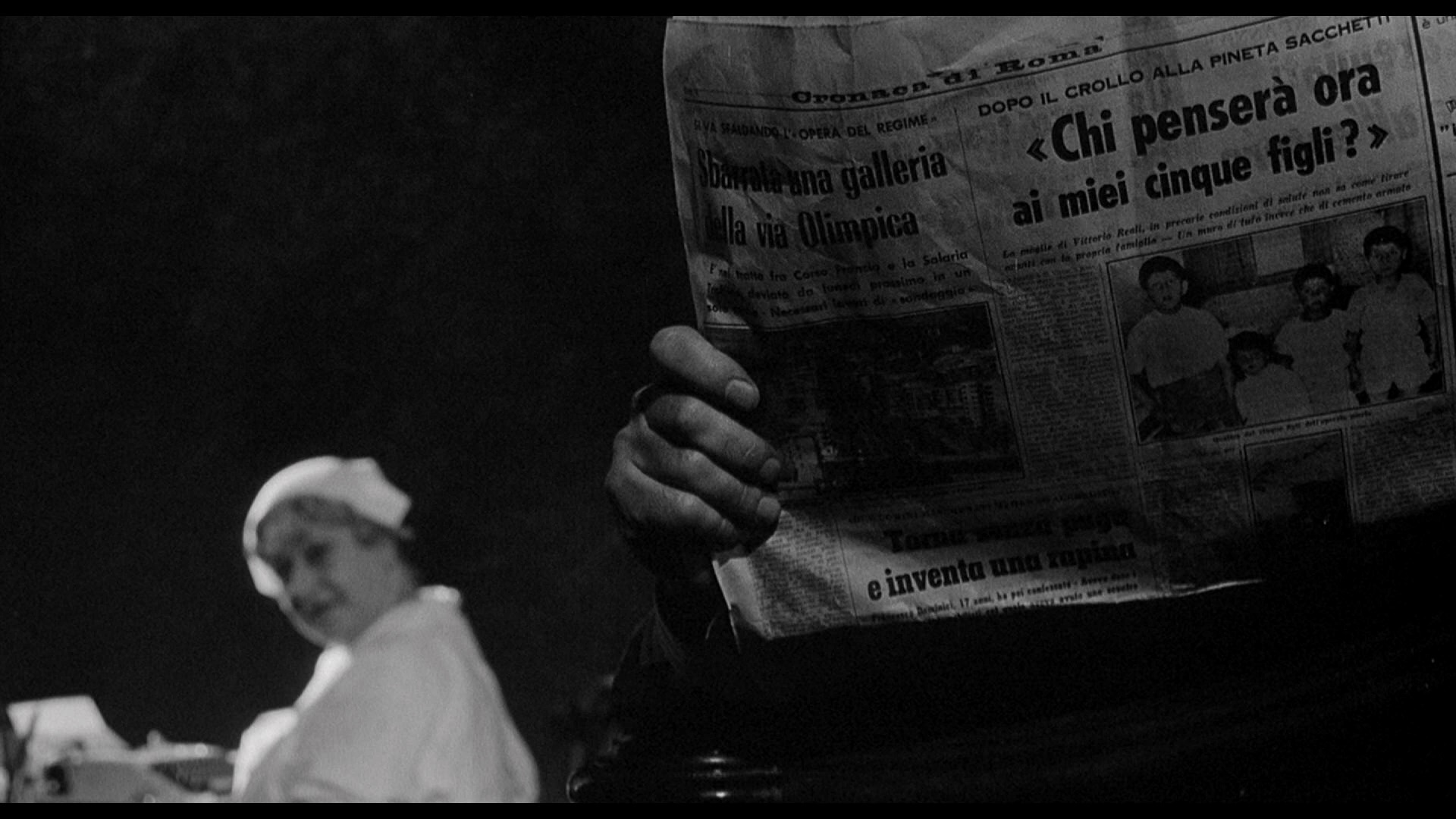
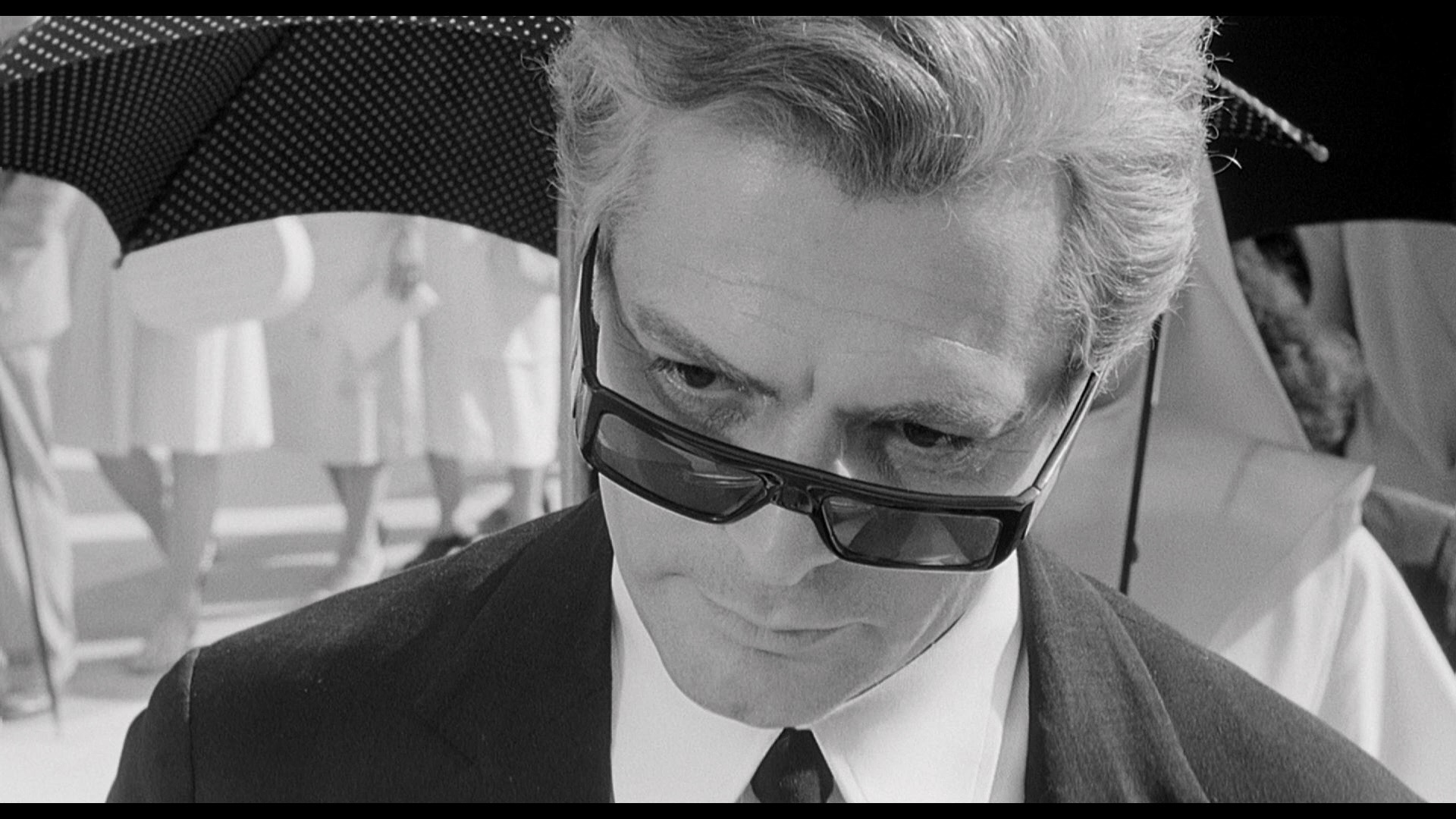

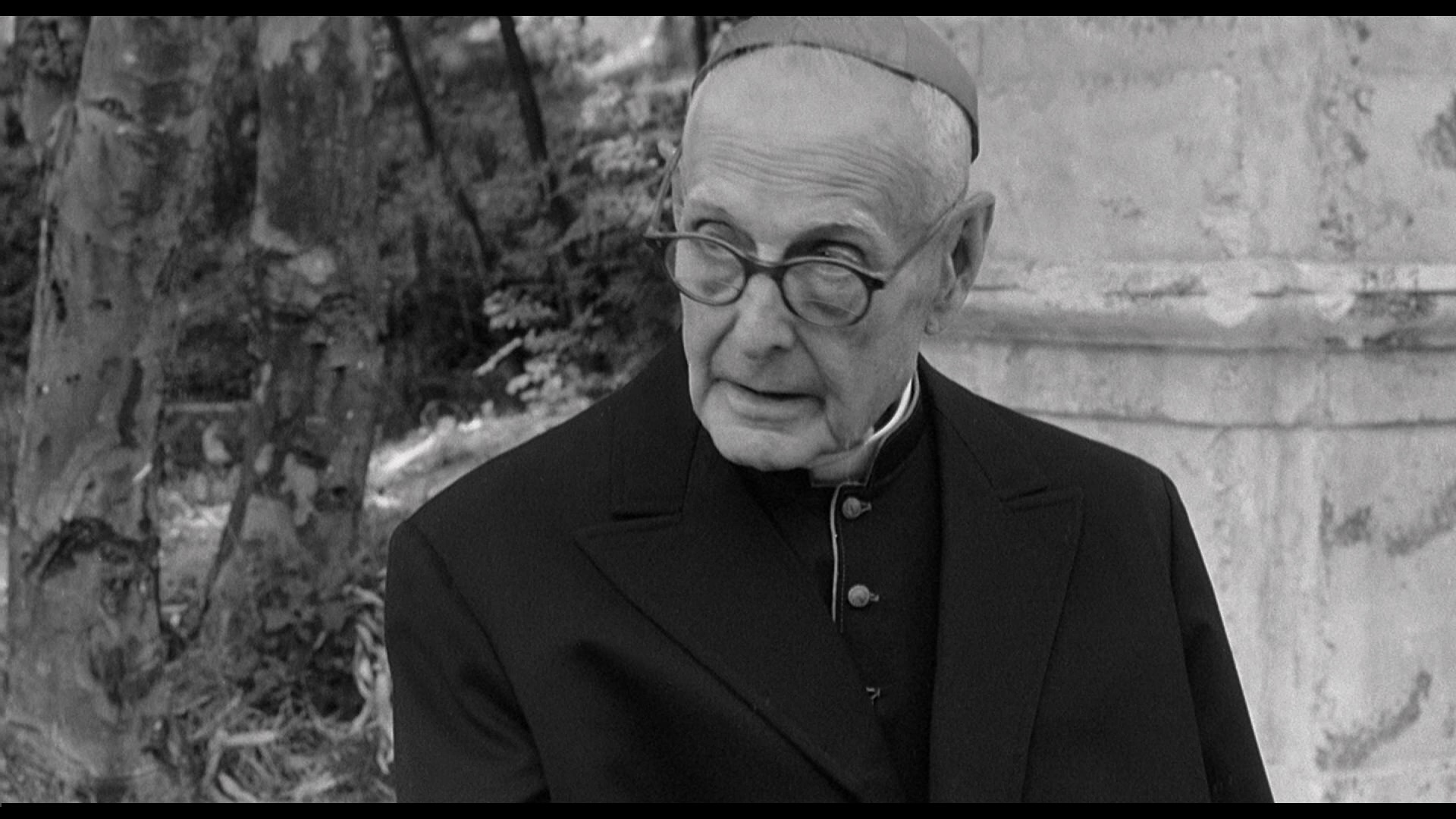
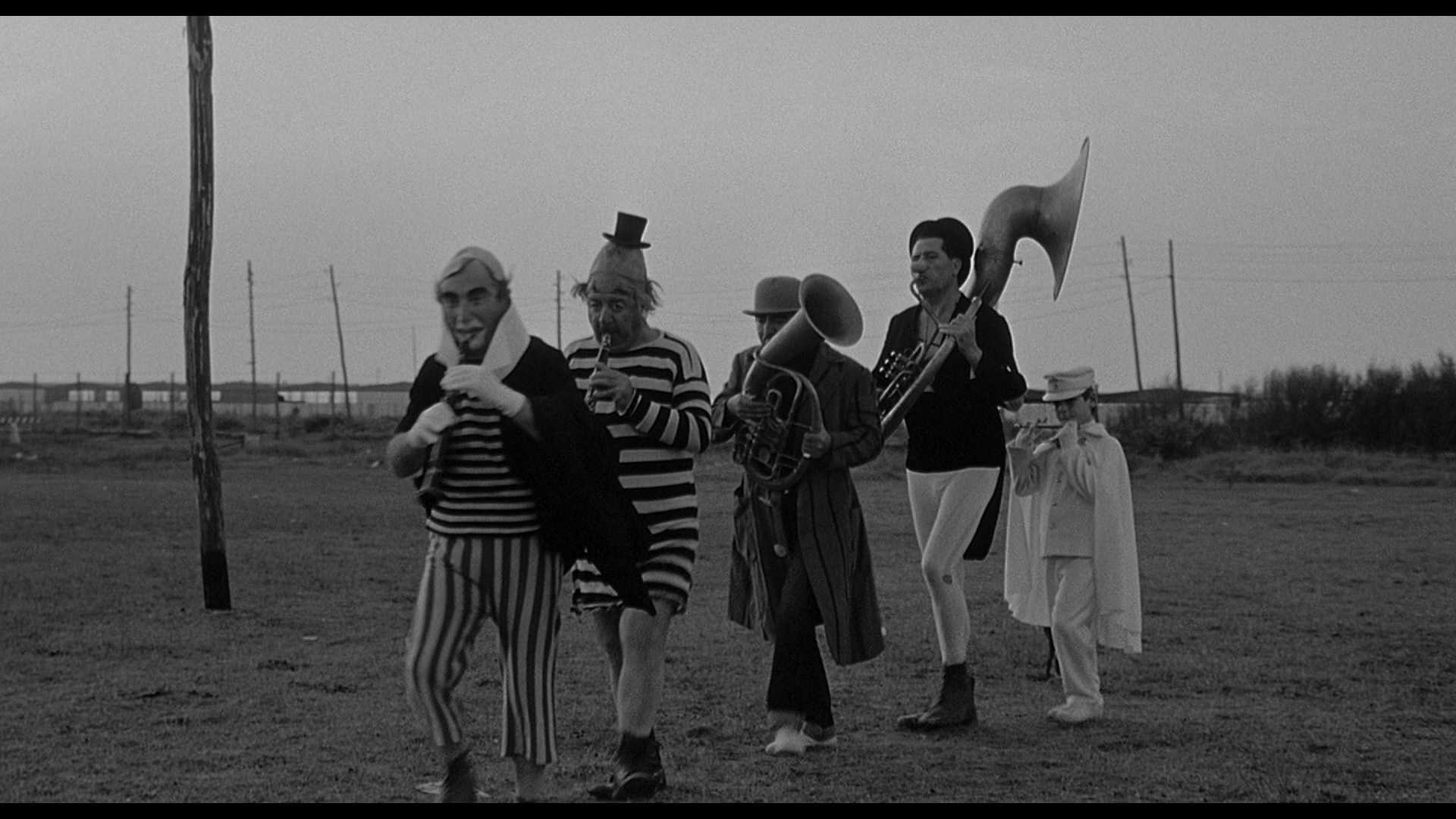
Updated review on February 26, 2020.
![]()
